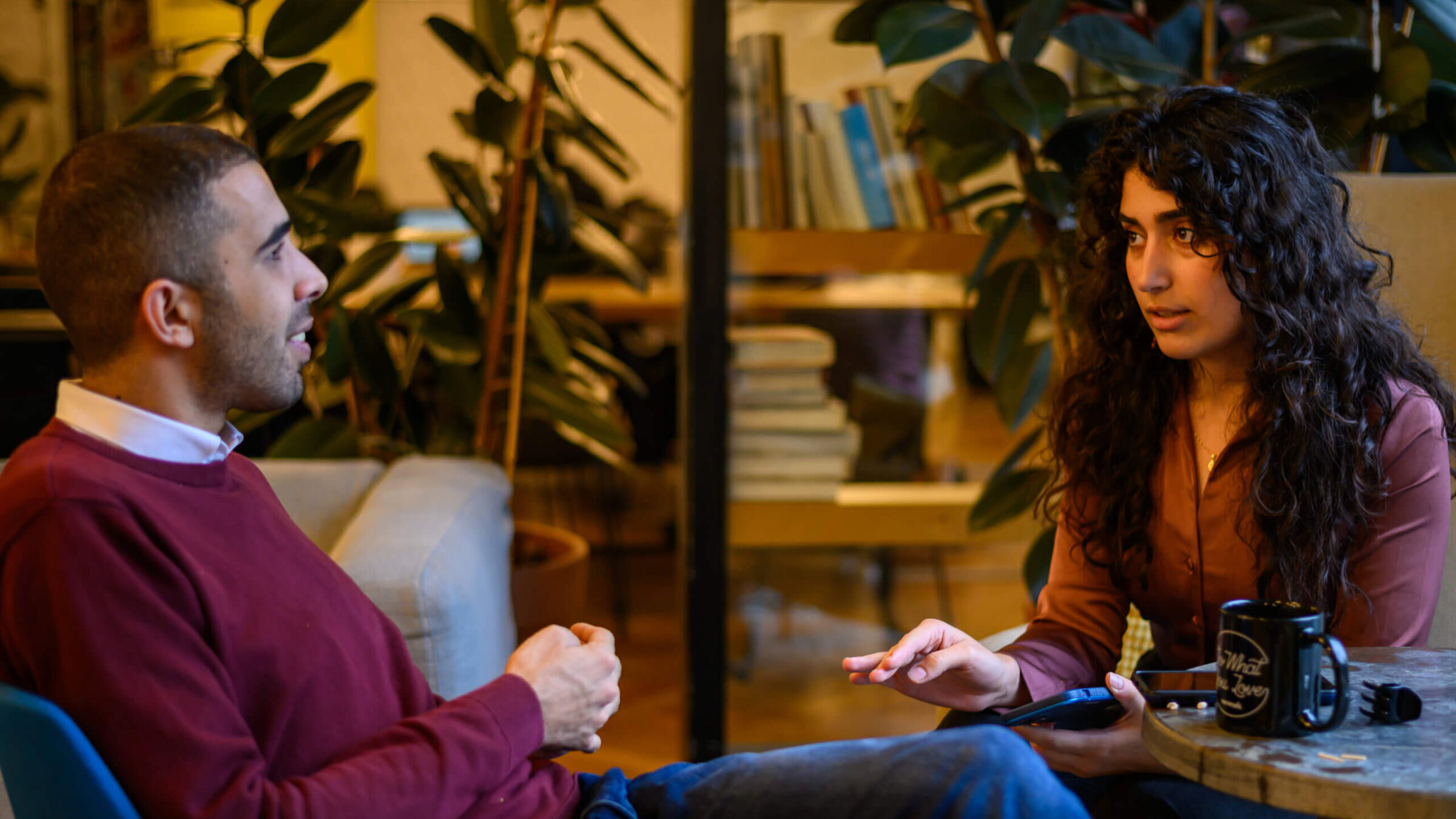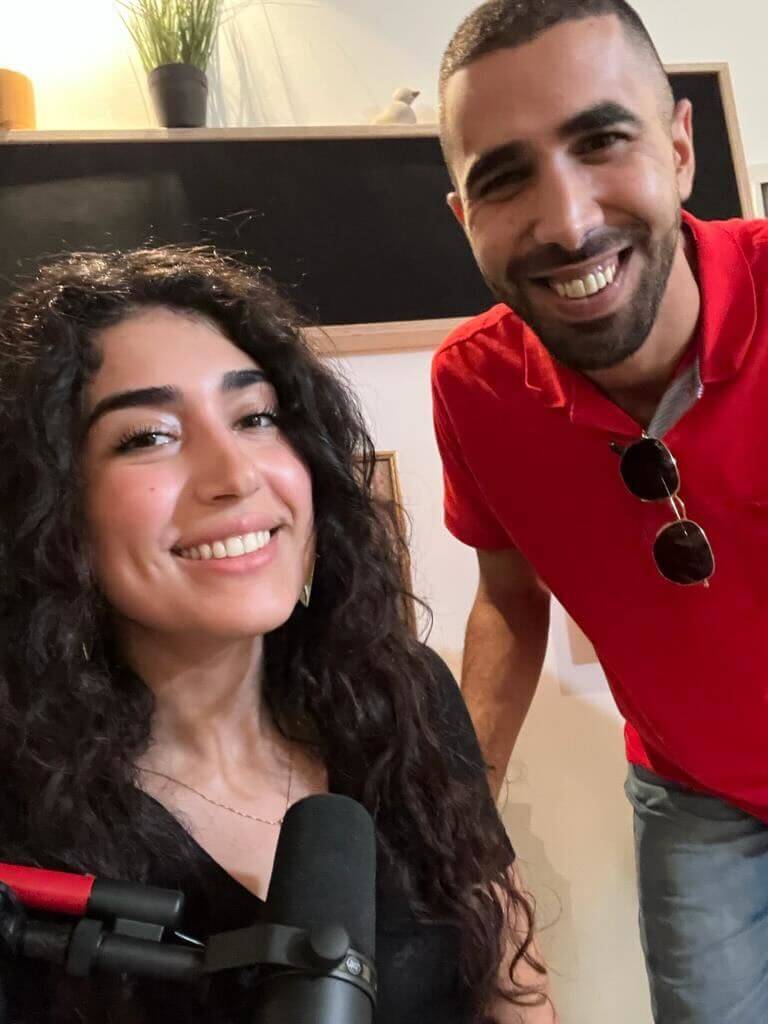‘We’re sick and tired of the West telling us what to do’: Palestinian Israeli peace activists speak out on a new podcast
Unapologetic: The Third Narrative is an incisive and vulnerable war-time podcast from two Palestinian citizens of Israel

Ibrahim Abu Ahmad (L), 31 years old, from Nazareth, and Amira Mohammed (R), 24 years old, from East Jerusalem, speak about their podcast ‘Unapologetic: The Third Narrative’ on the day the sixth episode is released on December 21, 2023 in Tel Aviv, Israel. Photo by Alexi J. Rosenfeld/Getty Images
“We are blessed and cursed by not having a mother tongue,” said Amira Mohammed, one of the two Palestinian Israeli hosts of the new podcast Unapologetic: The Third Narrative. She smiled when I asked what language she and her co-host, Ibrahim Abu Ahmad, speak together. The two are equally fluent in English, Hebrew and Arabic and speak a combination of the three when they’re together, something that draws looks from people who, she says, “are surprised by hearing whatever language they don’t expect to hear.”
The longtime peace activists that I spoke to over Zoom recently are two Palestinian citizens of Israel, a group that makes up 20% of the Israeli population but is not a community that is heard from often, particularly in the context of the Israeli-Palestinian conflict. The two hosts believe that their community’s perspective of living as Palestinian Israelis, the “third narrative” in the title, is essential to understand in order to achieve a lasting solution to the conflict.
A podcast for the moment
There have only been six episodes of Unapologetic released so far (the hosts are currently self-funding it) but its popularity is spreading rapidly, with 20,000 plays across all platforms, according to Podcasters — a podcast monitoring app — and more than 11,300 followers on Instagram. In my own feed, I have seen short reels from their filmed podcast conversations shared countless times; their follower count appears to grow by the thousands whenever I refresh their page.
Over the episodes, Abu Ahmad and Mohammed break down the history of the conflict beginning with the Oslo Accords, share their personal stories and how they became peace activists, and define terminology that is often weaponized on both sides.
Unapologetic has become popular because it offers its listeners not only a unique point of view during this horrific war, but because Mohammed and Abu Ahmad are willing to criticize Palestinian, Israeli and Western leadership.
‘Sick and tired’ of the West
Abu Ahmad and Mohammed launched the podcast on Oct. 29, three weeks after the Hamas terror attacks. Initially they had felt “devastated and helpless” like the rest of the country. Ibrahim reached out to Amira and asked if she wanted to do a podcast.
The sense of urgency that they bring to the episodes is palpable. “We saw so, so many voices from the West, voices from inside Israel and Palestine, that don’t actually represent the communities,” Mohammed explained. Both Mohammed and Abu Ahmad believe that those uninformed voices from the West are directly contributing to rising Islamophobia and antisemitism.
“We’re sick and tired of people from the West telling us what we need to do, what we need to change and how we need to change it, what resolutions we need and who’s the bad guy and who’s the good guy,” Mohammed told me.
In a recent reel posted to their Instagram, she repeats phrases that protest in the West are chanting, including “Support decolonization as an act, not as a theory!”
“How can you use these slogans and chants from the safety of your own home when you have no skin in the game?” Mohammed says. “Does our conflict feed your savior complex?”
Despite their frustration with the West, Abu Ahmad and Mohammed deliberately chose to conduct their podcast in English, in an attempt to not only have their message heard as widely as possible, but also to reach those Western activists who are taking sides in the conflict.
Amira and Ibrahim told me that they want the world to pressure both Israelis and Palestinians to find an end to the conflict. “It’s either, you know, ‘Save Israel,’ or, you know, ‘Free Palestine by any means necessary!’ And that’s not what we want,” he said.
“I do believe that what we’re doing is for the benefit of our people, and that’s the most important thing. When I say our people,” Abu Ahmad continued, “I mean both sides. They’re both my people.”
‘I see with two eyes’
During the episodes, the hosts continually draw a distinction between their experiences as “a ’48 Palestinian” (Abu Ahmad) and “a ’67 Palestinian” (Mohammed). Abu Ahmad’s family remained in what became the state of Israel in 1948 after the Nakba, while Mohammed’s family was split between Jerusalem and the West Bank.
Abu Ahmad was born and raised in Nazareth, and learned Hebrew by watching cartoons with his cousins and their Jewish friends. In the podcast, he describes the moment he received a scholarship to attend high school in the United States, and was told to bring a flag from his home. At a total loss as to how to choose to represent himself, he brought a kaffiyeh.
Mohammed was born in the U.K. to Palestinian parents, and lived briefly in California before moving back to Jerusalem when she was 6. Growing up in Sheikh Jarrah, an East Jerusalem neighborhood that is home to hotly contested fights between Jewish settlers and Palestinian residents, Mohammed quickly realized that she was “not a white girl” as she’d thought she was in California, but Palestinian and Arab. The word “Israel” did not exist in Sheikh Jarrah; instead it was “Occupied Palestine.” On the podcast, Amira shares the story of coming home from school one day to find her family’s home being partially demolished by Israeli soldiers.
Despite the privilege of their Israeli citizenship, Abu Ahmad and Mohammed are not immune to the racism and bureaucracy of the occupation. Yet they both affirm repeatedly during the podcast the fluid nature of their identities: They describe asserting their rights in Hebrew when they’re hassled by soldiers, and calling out Jewish Israelis when they overhear epithets against Arabs. The inherent duality of their existence defies the easy binaries the West attempts to impose on the conflict.
“I see with two eyes, Israeli and Palestinian,” Abu Ahmad says in the second episode. The hosts, Abu Ahmad in particular, see Palestinian Israelis as the “bridge” to ending the conflict.
“We are the only ones who are both,” he told me.
What the peace movement did wrong
In the fourth episode of Unapologetic, titled “The Day After — What happens next?” Abu Ahmad and Mohammed dive deep into the failures of the peace movement.
They point out several structural failures of peace organizations that prevent true understanding and collaboration with their Palestinian counterparts, which include having mixed-gender gatherings (often a no-no for conservative Muslim families) and few Palestinians in leadership roles. However the primary problem with the peace movement, they feel, is that of language.
The onus, they say, is on Palestinians to learn Hebrew, and not for Israeli Jews to learn Arabic, a dynamic that speaks to the inequality present within Israeli society. “We’re supposed to blend in, and then we’ll be accepted,” Mohammed sighs.
“‘Wow, you don’t look Arab!’” Abu Ahmad replies, imitating a Jewish Israeli. “As if it’s a compliment! We all look like each other!”
On the rare occasions when Hebrew is not the default language, English is. This means that the pool of participants for peace organizations to draw from are the privileged few with a strong English education. “You end up recruiting people who are already there [ready to make peace], and neglecting the rest,” Abu Ahmad laments during the episode.

‘Complexity is a good thing’
Both in the podcast episodes and during our conversation, Abu Ahmad and Mohammed railed against the West’s desire to boil the Israeli-Palestinian conflict down to simple binaries: white people vs. brown people; Jews vs. Muslims. “We’re seeing a lot of hate crimes around the world because of our conflict and in our name: both as Israelis and as Palestinians,” said Mohammed. “We wanted to put the facts straight.”
The three of us laughed when I mentioned how many friends in my personal circles were posting online about the conflict (“I had no idea I knew so many Middle East historians”). I asked them why they thought the West was so obsessed with Israel/Palestine.
“White guilt,” Mohammed said, bluntly. “We see it a lot: ‘Let’s help the uncivilized become civilized!’ What works in the West does not necessarily work in the Middle East.”
“The Palestinian case is still alive,” Abu Ahmad said. “There are generations and generations of refugees still alive, and more and more get added to the equation of conflict.”
“Antisemitism also plays a role in this,” he said. “There is an Israeli Jewish fixation in the international community, and we don’t want that to be the case.”
A shared future
Abu Ahmad and Mohammed both spoke of how traumatized Israelis and Palestinians are after Oct. 7, and that they are only now beginning to be ready to hear the sorts of conversations that the hosts have on Unapologetic. But their Jewish American audience, which makes up a large part of their listeners, is an essential player in the conversation.
Abu Ahmad spoke of how the Jewish American community had tacitly supported the Israeli expansion of settlements for decades with its silence on the issue. Now, in the middle of a war, the need to push for a lasting peace agreement, and a return to the two-state solution, something that both hosts endorse, is essential. “The Jewish American community has a very important role to say, ‘We need to do it now,’” he said. “Actual change comes from when people are willing to see the other as not the other.”
“There’s not even a question of ‘Is there hope?’” Mohammed added. “There’s no other choice.”
Unapologetic: The Third Narrative is available on Apple Podcasts and Spotify.
Editor’s note: The original version of this article misstated Amira Mohammed’s place of birth as the U.S. She was born in the U.K., but lived in the U.S. before moving back to Jerusalem.

















